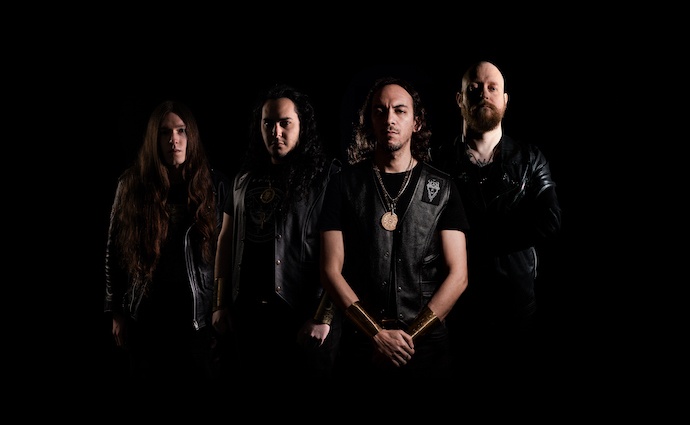
(Comrade Aleks brings us his interview with Ismaeel Attallah and Youssef Saleh from the Egyptian band Crescent, whose latest album was released at the end of last month by Listenable Records.)
Highly influenced by Swedish Black Metal in their early days, Crescent from Cairo, Egypt never hurried and have worked out their image patiently and carefully since 1999. This attitude and the band’s place of origin explain why it took so much time ’til they managed to finish their first album Pyramid Slaves in 2014. They didn’t wake up famous the next day, but a contract with Listenable Records and a few big festivals were in their hands.
Crescent totally changed direction with their sophomore album The Order of Amenti (2018), yet some pieces of black metal were left in their body though death metal influences were far stronger. And if you are wondering how this Egyptian blackened death metal sounds today, then Crescent’s new big work Carving the Fires of Akhet is your best chance to dig it out. Ismaeel Attallah (vocals,guitars) and Youssef Saleh (guitars) are our guests tonight.
******
Hail Ismaeel and Youssef! What’s going on in the band’s camp? What kind of options do you have today to promote the new album, Carving the Fires of Akhet?
Hail. Nothing new, simply watching the album release unfold. Promotion is in the hands of Listenable Records, we simply share our news on our platforms. On the label front, they manage the placement of the releases and what is released, when and where. Of course we are all aligned and on the same page. At the end of the day, there’s not that many options, just the usual platforms and it is up to the listeners afterwards.
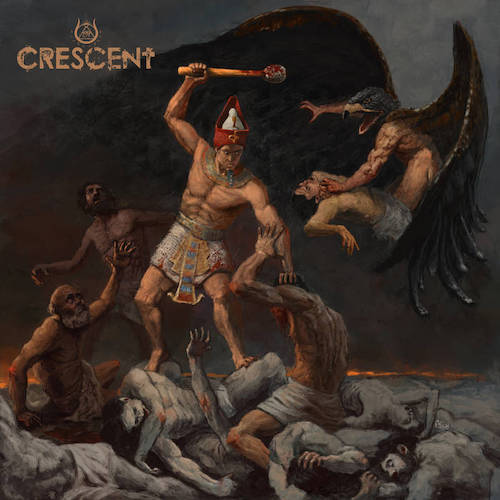
Did you discuss with the label an opportunity to make a short tour with some elements of show maybe in the future? I believe it would be cool to have a live video with elements of your cultural and historical aesthetics (when the whole quarantine thing is over).
We haven’t really discussed anything like that. It’s a bit difficult to do a live video right, but we kind of thought about it. As for our elements, we pretty much just set the stage up the way that we can identify with and makes sense to us. Surely, if we do a live video at an actual ancient Egyptian temple then that would be a whole different story. One could only dream then…
Let us start with a history lesson: It’s said the band was born in Cairo around 1999, but there were no releases for an entire decade. How did you spend this period?
We were active as a band, exploring sounds and we were also a dedicated Dissection cover band back in the day.
I think that the most famous Egyptian metal band is actually Nile from South Carolina. What can you tell us about your local metal scene? Which genres prevail in your area?
Nile is a pretty big Technical Death Metal band but what’s Egyptian Metal? Every other band had a harmonic minor melody here and there and an Egypt-influenced theme laced with something. We play Blackened Death Metal, period. Our lyrical themes might (from an outsider’s view) be comparable to some bands like Nile, but the way we narrate and delve into these themes is very personal and has to do with our individual unique DNAs, literally and metaphorically.
Extreme Metal (in particular Death/Black) has been the most dominant and the most expanding subgenre of Metal in Egypt since the ’90s. There isn’t that much of a scene though, just listeners with no (more) venues or media to resort to (with the exception of social media of course). The local scene has no labels, no concerts, and barely any fan-base that can substantially support a band.
Why do you think metal isn’t widespread in your region? Which factors slow down its invasion? Social ones or religious ones? How did you get into metal considering such surroundings?
For one, (Extreme) Metal music was never meant to be for “mass consumption”. Another point would be the fact that Metal music has “Western” origins, so the roots were already not widespread in our region before there was even Metal. The setup is more complicated than simply assigning it to one category or the other, and in that case you can’t say “the region”. Egypt’s political, economic, and social context is very different than that of its neighboring countries. We grew up in our sub-environment where our previous generations whre already opened to Rock music and eventually Metal music, and (Extreme) Metal spoke to us and became our passion. That was just to put it very briefly.
You had enough material for a full-length album back in 2005; why did you choose to never release it?
There was a full-length debut album that never saw the light as Ismaeel decided to throw it in the garbage. It was an awakening that rose within Crescent, yearning to find their own identity, since that album was all submerged in the vein of the Swedish Black Metal sound. We wanted to capitalize more on doing something more unique and connected more to where we are coming from. Hence Ismaeel took more time to adapt more to the new style, digest it, and come up with something more self-fulfilling at that time. Therefore, that was the main reason why there were some years of “disappearance” for those who checked our discography.
You released The Retribution EP in 2008. This material combines your death and black metal influences with some Eastern tunes, which turned out to be the band’s future. How did you come to this combination?
After basically switching from being a pure black metal “Swedish sounding” band and adopting the Eastern sound in the writing process and composition, The Retribution was born as a result of combining both worlds together somehow. Basically that’s also what you can hear on the new album Carving the Fires of Akhet but on a massively mature level after all those collective years of experience and international exposure.
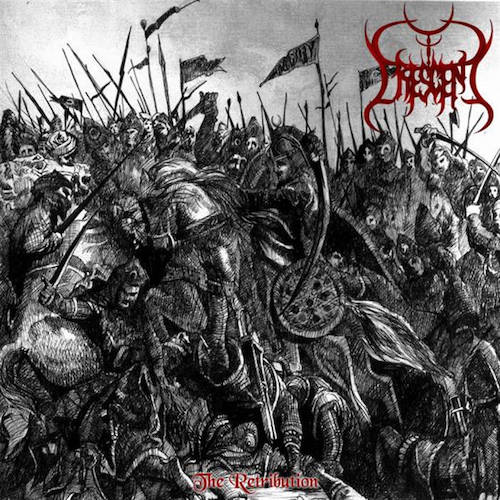
Some bands try to copy the sound and image of some legendary big bands and don’t care about their own identity. Crescent stands on the other side, developing its own features up to now. Why is it important for you to represent your own country and its culture?
It is at the core of our identity and how we reflect musically and lyrically. However, it is still mostly about this Extreme art. We are neither philosophers nor sports people, so not flag-bearers, but our identity comes forth one way or the other.
Crescent’s debut full-length Pyramid Slaves saw the light of day in 2014 despite your finding this balanced yet raw sound on The Retribution. What slowed down the recording of this album? What are your memories of this recording session?
It took time to find a suitable sound engineer to record with, We never had the experience back then and it never crossed our minds to record in a different country, although it could have been an option. Also it took me time to get used to the growling Death metal vocals. I actually had to halt the recording process for a couple of months to master doing the Death growls professionally and without damaging my vocal chords.
Really? How did you decide to switch to the new vocal style? And how did you work over your growls?
If you mean from the old days to when we self-released our debut album in 2014, then it was a natural switch because we always give the music/riffs what they need in regards to vocals and also drums, so when we switched to heavier down-tuned death tunes the vocals had to switch eventually to suit the riffs.
Working on my growls was a matter of practice really. Just like anything else, if you want to master something you got to give it time and be patient about it. I remember I had to pause the recording sessions of the debut album for several months until I reached the level I was aiming for. We had quadruple guitars recorded on the Pyramid Slaves album, and when you have such dense wall of sound then your vocals have to be strong enough to meet such density and not wear out in such massive sound. Therefore I had to accept the challenge and practice my growls and perfect it.
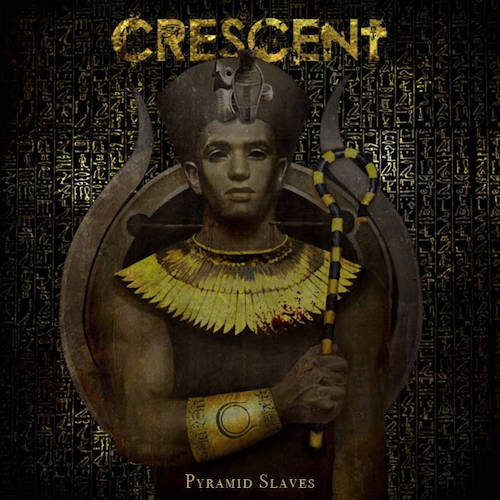
It’s subjective, but I hear faint Septicflesh echoes in the Pyramid Slaves tracks. Did you ever cross paths with this band?
Septicflesh! Yeah, I mean we met them on many occasions at multiple festivals where both bands performed, but we fail to see how you ended up with that comparison. The band is heavily loaded with symphonies and not that much attention is given to the guitar work, while Crescent is massively focused on the guitar work and everything else is built around it. On that record, and all the other ones, the so-called orchestral aspect is only used in a very controlled and intentional manner in order to serve a certain atmosphere or idea for particular moments. Take out the orchestrations and you’ll find the tracks not lacking a single thing and could be enough for those who don’t know the current versions. Some people might think that our sigil has something to do with Septicflesh, and that is pure “dumbassery” from an Egyptian’s perspective.
Nope, I’m meaning rather their and your interest towards ancient civilization, nuances… you know. And I don’t mean you follow their stuff — your identity is another thing. Are there bands with whom you keep in touch? With whom you’d like to tour or record a split?
The bands we keep in touch with are Death/Black bands that are thematically very different from us actually. We’re open to touring with a few bands in mind but doing a split is nothing we thought about before.
The Crescent’s first album was released DIY and you even launched a music video for the title song. How soon did you get feedback? Did you aim to release it strictly on your own or did you search for labels who could support you?
That’s true. The feedback was almost instant; we performed at Wacken and did a tour in Europe in the same year. It was our first real international spark, but it can only go so far for a band without a label and without any support (no scene or whatever, just our circle in Egypt and a few individuals abroad).
We did not look for a label; once the album was done and pressed, it was immediately released. We looked for a label with the second release when we thought it’s time to take things to the next level, and that’s when we got multiple offers and decided to go with Listenable Records.
This album has opened doors to European venues for you and you started to do tours in EU countries. But how did you organize gigs in your country before that? How did it work usually?
We do not organize gigs and we prefer to always avoid the headache and the hassle. We previously worked with trustworthy and professional (or at least responsible) organizers in order to perform in Cairo.
So how many times did you play in Cairo? What kind of venue was it?
Countless times. However, only once since the release of The Order of Amenti back in 2018. It is usually a pretty decent venue that can hold up to 1500 people, and it’s usually that packed. It’s also on the Nile.
What are your memories about your first encounter with Europe? Did you tour in a van or did you have more comfortable conditions?
It was spectacular although we were the openers, but we certainly needed that experience to handle a 10-day tour and hop from one stage to the next. Touring gives you lots of added values and makes you grow faster as a band. We rented our own fancy van, a nice Mercedes with beds and couch and WIFI! We paid a lot but had no regrets, though the painful experience was that we drove ourselves. It was Ismaeel and his ex-girlfriend who drove around 8500 KM in 10 days. I don’t recommend that to any young band! Don’t drive yourself unless you are in your 20s and have excessive energy. Hah!
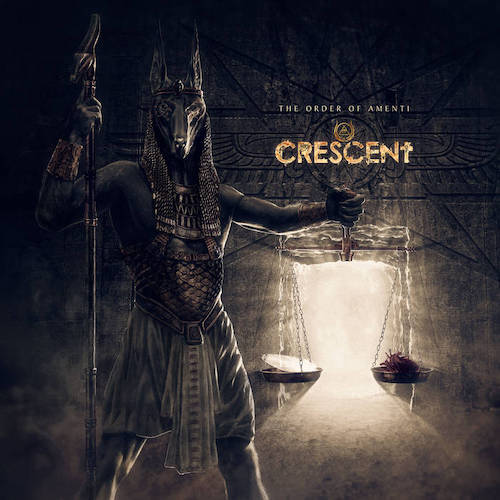
The band’s second album The Order of Amenti was released by Listenable and it seemed to be a breakthrough for the band. How did this collaboration change the band’s life back in 2018?
Well, it was absolutely refreshing to be working with professionals who were extremely passionate about Extreme Metal and were also passionate old-schoolers. We are very glad about our collaboration together. The band certainly grew and reached more people due to Listenable’s work. Of course, before listening to the records, some are driven by the label’s name.
By the way, when did you relocate in Germany? How did this move affect the band?
We did not relocate to Germany. Ismaeel, the main composer and the remaining original member, still lives in Cairo. Youssef moved to Germany to continue his studies, and then after our other two Egyptian members left, we decided it made more sense logistically to have new members in Germany. It also makes sense since we have many friends within the underground German Black/Death scene.
It did not affect us that much, just that rehearsals take place in Egypt and Germany. Ismaeel still rehearses with Amr (our former drummer) and Adel (former guitarist) while Youssef rehearses with the rest of the guys when the circumstances allow (due to the pandemic and all). Other than that, we expect our “movement” for shows in Europe to become more easy and flexible.
Right before the recording of your third album Carving the Fires of Akhet two core members left the band – Moanis Salem who played bass since 1999 and Amr Mokhtar who played drums since 2000. How did that happen and how soon were you able to find proper replacements?
No drama there, simply that Amr and Moanis were forced to make this choice due to private circumstances and priorities. We immediately knew who to ask to join, so it was pretty fast. Nevertheless, both of them are still part of our family and you will still find their names in our album credits. Amr basically composed all the drum lines and rehearsed some of the songs prior to the actual recording sessions, then Julian executed actually the tracking/recording of the drums, and did his own minor changes here and there.
The current German member Julian (our drummer) was a recommendation from Stefan (who actually was a personal friend of Ismaeel). Later, Stefan joined Crescent as a bassist.
How do you see the general differences between The Order of Amenti and Carving the Fires of Akhet? What were the most difficult parts during composing and recording for you personally?
The latter is more mature and grounded yet more dark and melodic. We did not try to replicate a previously functional formula; we entered this album with the mindset of not repeating what was already done on Amenti. Some similarities might arise of course, but even within the album you won’t find two similar tracks or any track that sounds like anything from our past releases.
With regards to the difficult parts of recording and composing: Generally of course we have some parts that were a bit tricky in their recording but we managed after several takes to nail them. Composition-wise, Ismaeel usually works based on the title of the songs where he draws images in his mind and then the riffs come out as an interpretation of such images or imagination. Usually when the main skeleton of a particular song or drawing shapes up, the rest of the song (as in bridges or soloing or whatever) comes in quite handy as the song itself becomes quite clear in what needs to be perfected. So, bottom line, we can’t really say there is a certain difficulty in composition as much as being able to depict such images and transfer them to sound. That’s all about it really.
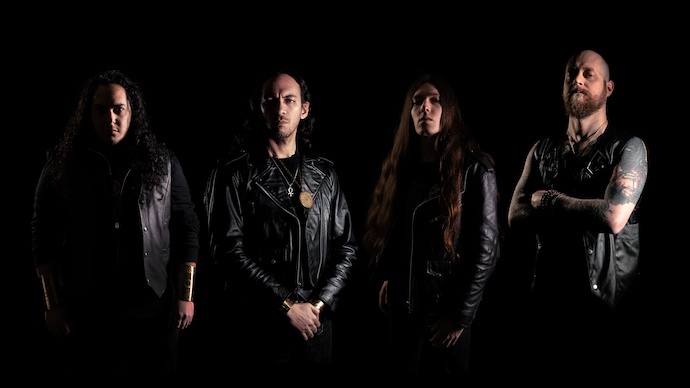
The press-release states that “lyrically, the album touches upon a primeval epic story that is full of struggle and blood. It also reflects drunkenness with divine power, and pure evil in its religious and historic form (and beyond)”. How would you comment on this description? Can you tell more about your work over the lyrical components of the album?
This description sums it as good as possible within a few sentences. Each track deals with a different principle, aspect, sanctity and/or blasphemy separately with references to history and religion. It goes through the filters that are our beliefs and principles, and that’s how the lyrics are molded to fit our minds and satisfy us.
Coming to the content: the tracks hold a thread that follows a sequence from the rising of the sun on the horizon in all its glory to it abandoning us and everything else, sinking into the waters of oblivion, in a metaphorical sense. The first track is purely based on a historic finding about the formation of the first Egyptian empire, the unification of the north and the south and all that follows in terms of traditions, thoughts, and so on. The tracks go on to tackle aspects of obsession with power to the extent of challenges the heavens (we’ve seen that in our lives) and then delves into the forms of incomprehensible darkness whose origins are unknown but later takes on a structure, face, and name of its own (with historical references).
Afterwards, challenging the unknown to conquer it and reaching glorious extents are tackled but that eventually brings us to a form of unparalleled hatred. Yet, a fight must be put up to maintain it and blood has to be spilled one way or the other. Finally, we delve into the eventuality of our lives being flooded by the darkness of our actions and this oblivious end will open its jaws until it swallows everything around us. It might sound metaphysical but it is actually more “human” and bound to reality than you might think. Nothing new here, we are just living all that and speak of it through the eyes and tongues of our ancients.
The lyrical themes arise from our personal thoughts, life experiences, beliefs and convictions, and sometimes simply from conversations. We knew exactly what we wanted to write about in album #3 since before The Order of Amenti was released. The tracks are also written with the lyrical ideas in mind, and then the lyrics simply follow, and that is a pretty intense (albeit smooth) experience. It can open up discussions about the meaning of every single word in the context and what they mean for us.
Thank you for such detailed, in-depth answers! I hope Fires of Akhet will lure more followers under Crescent’s wing, so that’s all for today. May you add a few more words for our readers?
Keep the fucking flame alive and high and do not treat extreme art like it is some kind of a disposable thing. Otherwise, you will be swallowed by the great serpent.
https://www.facebook.com/Crescentband
https://crescenteg.bandcamp.com/

Good stuff. They must be tired of the endless Nile comparisons. I’m hearing very dynamic songwriting that very much stands on its own.